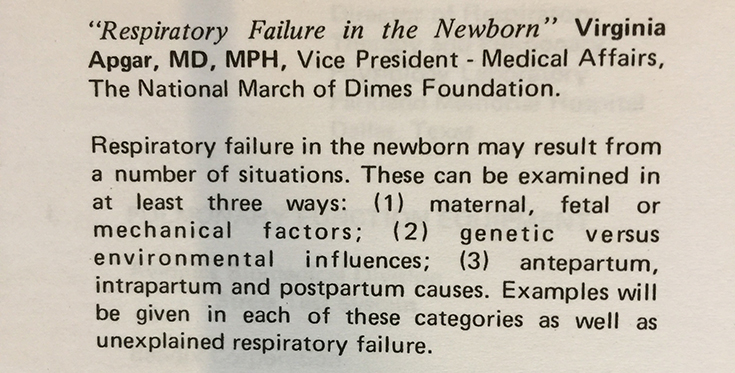
If you went to the Google search page today you saw a picture of a female doctor and a tiny baby, along with the word “APGAR”. Today’s “Google Doodle” honors Dr. Virginia Apgar on what would have been her 109th birthday.
Many respiratory therapists know her as the physician who established the Apgar Score in 1952 to identify problems in newborns before they even went home from the hospital.
But did you know Dr. Apgar once spoke at an AARC Congress? She did – it was the 1973 meeting in Atlanta, GA, and she addressed the topic, “Respiratory Failure in the Newborn.” She was there as a representative of the National March of Dimes Foundation, where she was then serving as vice president of medical affairs.

Lasting impact
AARC Associate Executive Director-Member Services Shawna Strickland, PhD, RRT, RRT-NPS, RRT-ACCS, AE-C, FAARC, practiced as a neonatal therapist earlier in her career and says the Apgar Score was an integral part of responding to deliveries.
“Dr. Apgar made such a massive and lasting impact on how and when we respond to newborns’ need for intervention in the first five minutes of life,” she said. “The attendees of AARC Congress 1973 had an amazing opportunity to learn from Dr. Apgar directly.”
Dr. Apgar invented her famous score after noticing that while the infant mortality rate in the U.S. was on the decline, infant deaths within the first 24 hours of birth had remained constant. The Apgar test – which has also come to stand for Appearance, Pulse, Grimace, Activity, and Respiration – assigns a score from zero to two to each of those five criteria, with scores of seven or above considered normal, scores between four and six fairly low, and scores three or under critical.
The test has been credited with saving the lives of many babies whose conditions might have otherwise gone undetected until it was too late for effective interventions.
True inspiration
The Apgar test is still used in hospitals today and Dr. Virginia Apgar remains a true inspiration to respiratory therapists everywhere and women in general who are exploring new frontiers in respiratory research and science.
As she so famously said when asked why she always traveled with basic resuscitation equipment, “Nobody, but nobody, is going to stop breathing on me!”
You can learn much more about Dr. Apgar on her Profiles in Science page on the U.S. National Library of Medicine website.

Email newsroom@aarc.org with questions or comments, we’d love to hear from you.

















